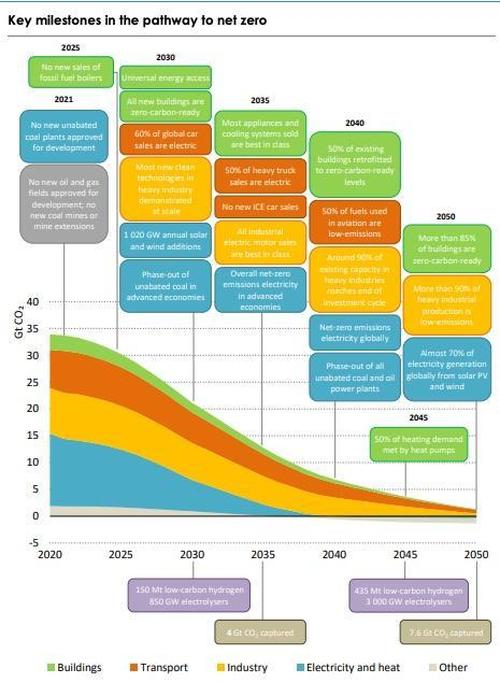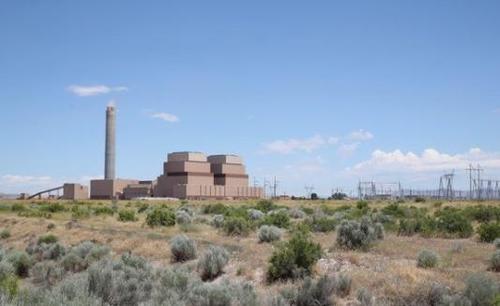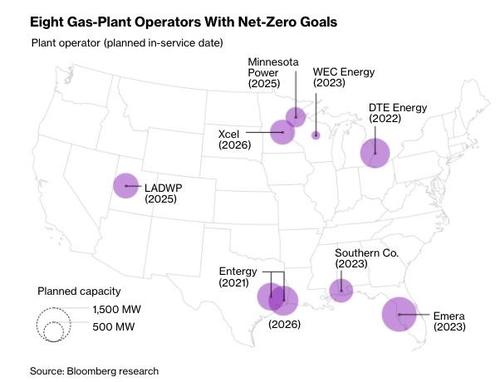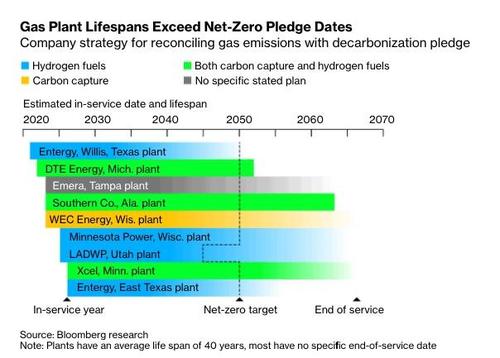by TYLER DURDEN
As a recent study from the IEA showed, achieving the emissions goals laid out in the Paris Accords would require oil and gas companies to halt all new projects. Among other things, the report included a daunting timeline of milestones that must be met to achieve net zero by 2050.
But if anything, the world is moving in a different direction, as a Bloomberg story published Friday shows. Because while President Biden has decided to re-enter the Paris Climate Accords and vowed to take steps to place the US electric grid on the path to net zero emissions by 2030, American utilities are continuing to pursue new gas projects that would far outlast Biden’s administration. Expansions have even been authorized for goal and oil plants.
It’s just the latest evidence that Biden’s green rheotic doesn’t square up with reality.
The red-and-white flue stacks of the James M. Barry Electric Generating Station tower over the Mobile River, belching steam into the Alabama sky. The sprawling complex of coal and natural gas plants already spews more than 7.5 million metric tons of carbon dioxide-equivalent every year. Now it’s about to get even bigger, with a seventh unit estimated to cost $635 million by the time it starts service in 2023.
The new gas plant, and others like it, has a 40-year lifespan. That means it will still be there in 2035, the year that President Joe Biden has promised a zero-emission electricity sector, and in 2050, the deadline set by its owner, Southern Co., to reach carbon neutrality. It could even burn past 2060, more than a century after the first coal facility opened on the site — making the complex a testament to the endurance of fossil fuels.
The decision by one of the biggest U.S. power companies to develop new fossil fuel assets is hard to square with a low-carbon future. But it’s not unusual. At least eight large utilities in the U.S. are building new gas plants right now, and another five are thinking about doing the same. That lays bare an uncomfortable truth about the sector’s commitment to fighting climate change: All those carbon-neutral pledges don’t necessarily mean quitting fossil fuels.
“It seems like false advertising or greenwashing,” said Drew Shindell, a professor at Duke University who studies climate change. “We can’t be building gas infrastructure in the 2020s and 2030s. We need to be closing it down.”
As BBG notes, if all of the plants under consideration are ultimately completed, they would release 35 million metric tons of carbon dioxide into the atmosphere, roughly equivalent to the emissions of every car in Florida.
Source: Bloomberg
Source: Bloomberg
Why is this? Power companies insist that gas is an important “transition fuel” since it’s both relatively cheap and reliable. California learned the hard way that aggressive restrictions on gas capacity feeding the state power grid can lead to problems: the state was forced to resort to rolling blackouts last summer when a heatwave taxed the electric grid at night when solar was offline.
Solar simply isn’t reliable enough to be relied upon, as one source pointed out.
“Cloud cover comes and goes,” said Katharine Bond, vice president of public policy and state affairs at Dominion Energy Inc. “The winds slows. We’ve got to have something that we can ratchet up.” Dominion, which has a 2050 net-zero pledge and is required by Virginia to be 100% carbon free by 2045, is also considering building a new natural gas-fired plant.
At least one of these plants – Southern’s new Barry plant – will support the 2050 goal because it’s designed for both carbon capture and mixing hydrogen, said CEO Tom Fanning.
Utilities claim they’re committed to getting “to zero”. Southern, Dominion and others say they plan to eventually invest in green technology to capture and dispose of their emissions, or rework those facilities to burn cleaner fuels like biogas or hydrogen made from renewable sources. However, neither of these strategies has been implemented at scale, and both remain uneconomic at today’s prices. Which means the exact plan for getting to zero still isn’t clear. And two companies, DTE Energy and Xcel Energy, have acknowledged that their carbon goals are based on technology that doesn’t really exist.
Another option being considered by at least one utility is retiring these gas plants after 25 years instead of 40. Duke Energy, the biggest utility in the US by customer count, is weighing considering building 15 more gas plants, but if the company moves forward with these plants, it will set its climate policy goals to retire them early.
Amusingly, Duke customers like Apple, Facebook and Google have complained that these new plants could become a “financial albatross” for decades.
So far, utilities have announced plans for over $70 billion-worth of new gas-fired power plants through 2025, nearly all of which will cost more than clear energy projects,according to a 2019 RMI report. As the cost of clean energy falls, these plants are all expected to become uneconomic to operate by 2035. Despite this, alternatives just aren’t ready yet to stand on their own, so utilities have no choice but to continue investing in natural gas, even as the steady transition to renewables appears unlikely to reverse.
The takeaway: ignore politicians’ lofty targets. The reality is that by forcing utilities to transition to clean energy before the technology is ready and prices have adjusted will force consumers to incur higher power costs while also putting energy grids at greater risk for a Texas-style collapse.
Only progressive wingnuts like AOC would be willing to risk the political blowback that might ensue.









